Rusted gas meters or gas piping
Home » Plumbing » Gas Meters & Valves »
Rust formation on gas meters and gas piping is primarily due to the presence of moisture and oxygen, two key ingredients that cause iron and steel to corrode. This process is accelerated in certain conditions, such as:
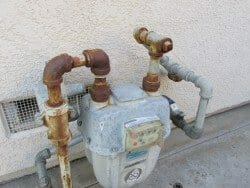
- High Humidity and Moisture Levels: Homes in areas with high humidity levels or those that experience frequent rainfall are more susceptible to rust issues.
- Proximity to saltwater significantly increases the risk of corrosion. Coastal regions around the world, including the Eastern and Western coasts of the United States, are particularly vulnerable due to the presence of salt in the air from the ocean. Salt accelerates corrosion, making metal components like gas meters and piping deteriorate more rapidly than they would in non-coastal areas.
- Regions with high levels of industrial pollution can also see an increased rate of corrosion on metal surfaces. Pollutants can react with metal components, leading to accelerated rust formation. This is often seen in urban or industrial areas where emissions from factories and vehicles are higher.
- In areas that experience harsh winters, the use of road salt to manage ice can also contribute to rust formation. While this might not directly affect underground gas piping, exposed meters and above-ground infrastructure can be susceptible to corrosion due to splashback and salt-laden moisture in the air.
- Lack of Maintenance: Neglecting regular maintenance and inspections can lead to unnoticed leaks or condensation, fostering an environment conducive to rust.
- Aging Infrastructure: Over time, gas meters and piping will naturally degrade, making them more vulnerable to corrosion. It is possible for an older meter to get to the point of needing to be replaced.
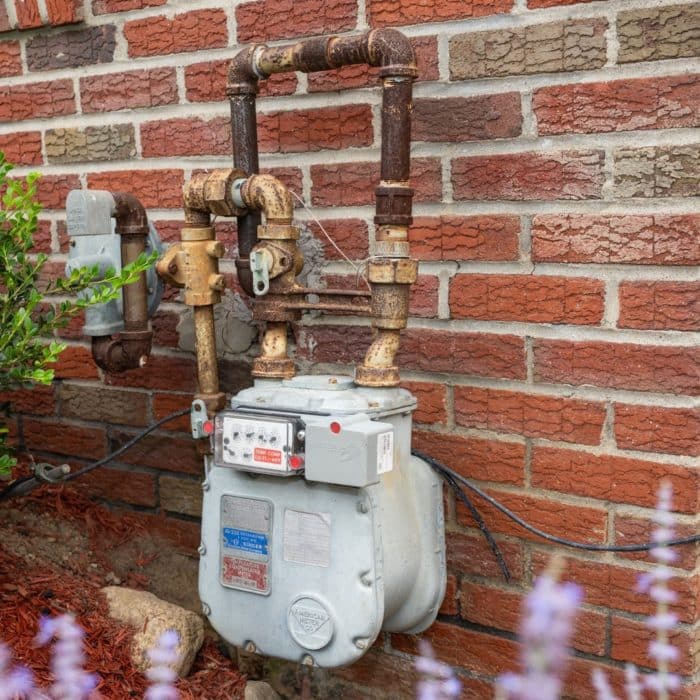
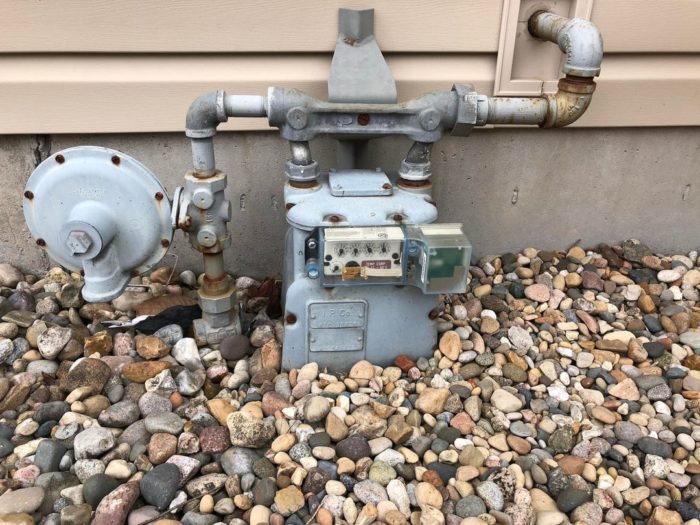
Is Rust a Cause for Concern?
The presence of rust on gas meters and gas piping does warrant attention for several reasons:
- Safety Risks: Rust can compromise the structural integrity of gas piping, leading to leaks. Gas leaks pose a significant safety risk, including the potential for gas poisoning or explosions.
- Efficiency Loss: Corroded pipes and meters can affect the efficiency of your gas system, leading to higher energy costs and reduced performance.
- Compliance Issues: Depending on local regulations, heavily corroded gas equipment may not comply with safety standards, leading to fines or mandatory repairs.
Implications of Rust on Gas Systems
The implications of rust can range from minor inconveniences to serious safety hazards:
- Leaks and Damage: The most immediate concern is the potential for gas leaks, which can endanger the lives of inhabitants and lead to costly repairs.
- Financial Impact: Addressing rust-related damage can be expensive, especially if it necessitates replacing large sections of piping or the meter itself.
- Property Value: Visible corrosion on gas equipment can detract from a property’s value and appeal to potential buyers.
Solutions and Preventative Measures
Fortunately, there are steps homeowners can take to address and prevent rust on gas meters and piping:
- Regular Inspections: Have a professional inspect your gas system regularly for signs of corrosion or leaks. Early detection is key to preventing serious issues.
- Corrosion Protection: Applying protective coatings or paints to gas meters and exposed piping can help shield them from moisture and delay rust formation. In some areas of the United States the gas company will paint your meter, however most will have you do it yourself. If you feel your meter should be painted make sure to contact your gas company as they often have specific guidelines to ensure safety and functionality of your meter. They can also advise you on what type of paint to use and any other regulations that need to be followed. Pacific Gas and Electric, PGE will paint your meter and piping standard gray color for free.
- Environmental Controls: For homes in high humidity areas or near the ocean, consider implementing measures to reduce moisture levels around gas equipment, such as improved drainage or shielding equipment from direct exposure to salt air. If your gas meter is in an area that frequently floods or leaves it partially submerged in water, speak with your gas company about possibly having it raised or moved. If this is the case, make sure to address drainage prior to potentially moving or raising the meter.
- Replacement and Repairs: In cases where rust has significantly compromised the gas system, replacing the affected sections or the entire system may be necessary. Opt for materials that are resistant to corrosion, such as stainless steel or specially coated metals.
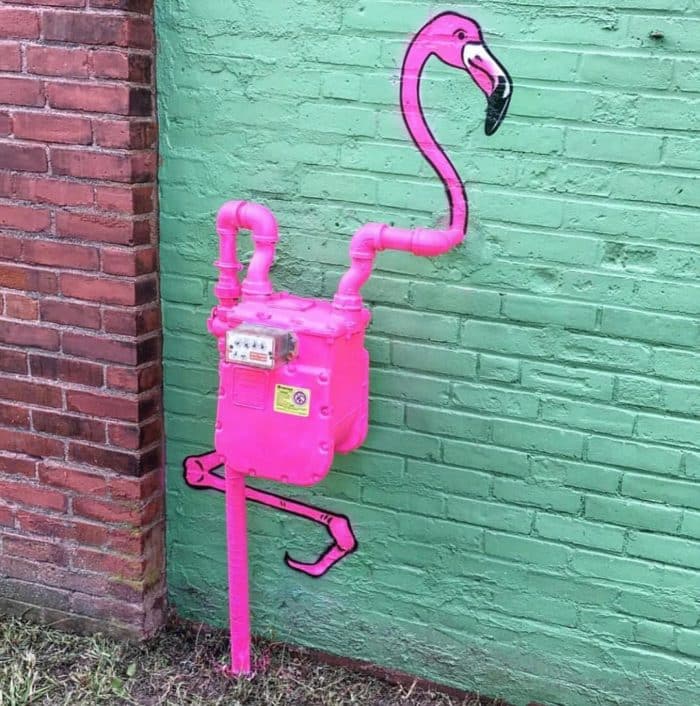
If you smell gas – Get to a safe location and call the gas company or fire department immediately!
If you smell gas by your meter, it’s essential to act promptly and cautiously to ensure your safety and the safety of others around you. Gas leaks can be dangerous, posing risks of fire, explosion, and poisoning. Steps you should follow immediately:
- Evacuate the Area: Leave the area where you smell gas immediately. Do not attempt to locate the gas leak yourself. Evacuating helps prevent potential health risks associated with inhaling natural gas.
- Avoid Using Electrical Equipment: Do not use anything that could create a spark, including light switches, telephones (including mobile phones inside the leak area), or any electrical equipment. A spark could ignite the gas and cause an explosion.
- Do Not Smoke or Use Open Flames: Steer clear of cigarettes, matches, candles, or any form of open flame. These can also ignite the gas and cause an explosion.
- Ventilate the Area If Safe to Do So: If it is safe and you are in close proximity to the indoor area where you first smelled gas, open windows and doors to allow the gas to disperse. Only do this if you can do so quickly and without creating a spark.
- Shut Off Gas Supply If Necessary: If you know how and it is safe to do so, you can turn off the gas at the meter. However, your priority should be to leave the vicinity of the leaking gas, so only consider shutting off the gas if it does not put you in any danger. In certain states and countries, this may be a role reserved for emergency personnel, so know your local protocols.
- Move to a Safe Distance: Rally at a safe location at a good distance from your home. Choose a distance up to where you can neither smell the gas nor is there any opportunity for it to catch fire from the gas in the atmosphere around you.
- Contact Emergency Services or Gas Utility Provider: Once you are in a safe area, use your cell phone or a neighbor’s telephone to call your local natural gas utility’s emergency line or local emergency responses like the fire department to report a potential gas leak. Provide the operator with all the known information and act on any advice provided.
- Arrange for an Urgent Inspection and Repair: The gas company or fire department will instruct you on the proper official process to have the issue inspected, but ensure a professional, licensed technician repairs any leaking pipes or tunings.
- Do Not Re-enter the Premises Until Deemed Safe: Stay away from the potentially affected area until it has been inspected by professionals and officially declared safe to return.
- Seek Medical Attention if Unwell: If you experience symptoms like dizziness, shortness of breath, nausea, or headaches, which could result from gas exposure, seek immediate medical advice or help.

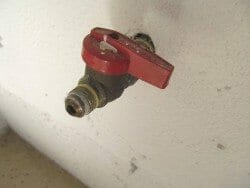


I live in Coventry RI. My gas meter is very rusty. Am I responsible for this repair or will the gas company hndle this?
Please reach out to the gas company directly!